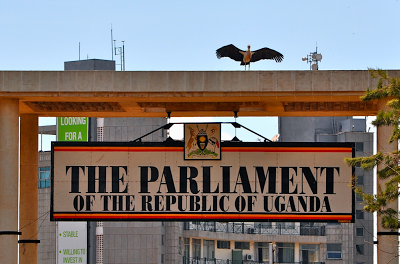
By Maria Wamala
Although the 1995 constitution under chapter 6 vests a powers in the legislature, parliament in Uganda does not fully use these powers. The 9th parliament’s first year promised a more vibrant and independent parliament compared to its predecessors but with time, it lost the gas.
Lawyer and former parliament reporter Peter Okello Jabweli says that the parliament now has surrendered its powers to the executive. He goes on to say that this is because majority of the members belong to the ruling National Resistance Movement (NRM) party. “They cocuse almost on every issue on the floor of parliament, find a common stand and it’s a crime for any party member to give a different opinion while on the floor.” Okello says.
Coupled to that, he says that the members of parliament double as cabinet ministers and at the same time representatives of their constituents. This creates conflict of interest between addressing issues in their constituents by presenting them on the floor or addressing interests of government by defending government in its failures to address issues in the constituents. The best example is the former Prime Minister Amama Mbabazi. Member of parliament for Kinkizi South, Secretary General NRM and leader of government business at the same time.
Okello notes that it is a different story in Kenya. He says that, “The executive is clearly different from the parliament. You have to resign as a member of parliament to become a minister. You can’t hold two posts at the same time.”
Some concerned citizens and civil society have expressed the same view in Uganda although it has not been formalized. Omara Atubo in the 8th parliament proposed it but when it was brought on the floor of parliament, it was thrown out immediately and Atubo later also became a minister.
Constitutionally, parliament under Chapter 6 of the 1995 Constitution, creates parliament and empowers it to independently legislate, pass laws, approve budgets, perform oversight role on the executive and judiciary. It even creates parliamentary committees like the Public Accounts Committee (PAC), Committee on Statutory Authorities and State enterprises (COSASE) to oversee government expenditures and government business. This parliament role can only be executed effectively when members have an independent mind which is no longer the case.
Recently, the Deputy Speaker of parliament Jacobs Oulanyah lashed out on legislators in a press briefing at parliament. He said that the quality of discussion on the floor has deteriorated because members are less informed on issues because they not research.
According to Okello, this can be linked to the fact that politics is now commercialized. Voters go for money not quality from candidates. He says that ttose without money and are of quality are ignored thus voting in uneducated people as members of parliament which is reflected in the quality of discussions on the floor.
Federal Alliance party president Betty Olive Namisango kamya agrees that the uneducated members of parliament coupled with the law quality discussions become a soft target for the executive to assert its powers in parliament decisions because they cannot competently stand to challenge the state.
Politics is now a lucrative venture according to Okello. He says that many people are going in for politics because there is quick money. Currently there are 375 members of parliament yet parliament chamber was built for 80 people.
This has impacted on the quality of discussion because due to the big numbers each member is given only three minutes to make a point in plenary. Mukono South representative Nambooze Betty Bakileka says its little time for a member to make a point in only three minutes especially members who like to illustrate stories in their constituents for clarity.
On a number of cases, the executive has also disregarded the decisions of parliament. In 2007 the government through the then Minister of Information, Ali Kirunda Kivejinja refused to commit itself to any timelines to re-open NTV despite pleas from the Members of Parliament who accused the executive of deliberately undermining the authority of the parliament and frustrating an investor. The Speaker Rebecca Kadaga got frustrated and concluded that, "We have done our part and stated our position which is that NTV should be reopened. We leave the rest to the executive."
The idea of supping powers by the executive is not exclusive to parliament but also in court. In 2007, Ugandan security forces raided the High Court in Kampala and re-arrested a group of Peoples Redemption Army (PRA) treason suspects who had been granted bail by a judge.
This followed an earlier incident in 2005, when paramilitary personnel laid siege to the same High Court and re-arrested the 22 treason suspects who had been granted bail. After the second court siege, the judiciary (judges, magistrates and other court workers) went on strike on March 5, accusing the Government of Uganda of violating the independence of the judiciary.
The judges noted that there was repeated violation of the sanctity of the court premises, disobedience of court orders with impunity and constant threats to the independence of the judiciary. "We want the executive to apologize for the events that have been occurring at the High Court, and reassure us that these events will not be repeated," demanded the deputy Chief Justice then, Leticia Kikonyogo.
Oscar Kihika, then the president of the Uganda Law Society said there had been repeated government interference and refusal to comply with orders of the court, particularly with regard to the PRA suspects. He said that "The manner in which organs of the state under the executive arm of government have defied court orders, and even gone ahead to arrest suspects that have been granted bail on court premises, is very frustrating." He is quoted to have lamented.
Later, the Internal Affairs Minister then, Ruhakana Rugunda said that although the police had respected the court's decision to release the suspects on bail, the suspects had to be re-arrested and charged with murder.
Although Uganda is a modern 'democratic states' and has adopted the model of separation of power in the constitution to protect democracy and prevent dictatorship, it seems to be only on paper as two of the three arms of the state; the legislature and judiciary are only respected when 'there is need' and disregarded when the executive finds it fitting.
The proponents of separation of powers believe that it protects democracy and forestalls tyranny while the opponents like Professor Charles M. Hardin say that regardless of whether it accomplishes this end, it also promotes executive dictatorship and unaccountability, and tends to marginalize the legislature. ENDS
The author is an MA student at the Department of Journalism and Communication
- Log in to post comments




